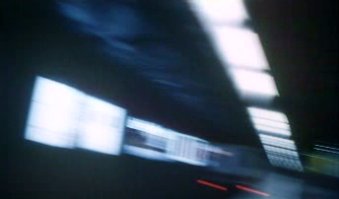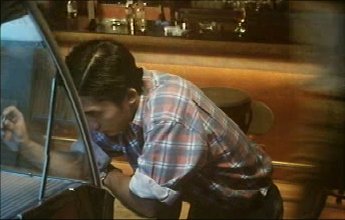|
Text and layout © Ed Shum, 2003. Ed Shum asserts the moral right to be identified as the author of this work |
|
Long Reviews |
|
Identity and Chungking Express |
|
Chungking Express is definitely something special. |
|
I won’t say that it is Wong Kar-Wai’s best film, but it does manage to capture something so ethereal, so living that it seems unique. Of course, it was the film where Hong Kong’s premier maverick movie triumvirate - director WKW, production designer William Chang, and Australian director of photography Chris Doyle - decided to break with their tradition of glacial paced shooting schedules to shoot a movie in three weeks, the resultant film being a wild ride of emotional uplift and pure cinematic charisma. However, such is the spontaneous energy felt by the audience that the deeper aspects of the film are often ignored or dismissed. |
|
Identity and Chungking Express |
|
|
|
[Page 1] |
|
End |
|
Generally, WKW certainly resembles the idea of the auteur as characterised by certain European post-war filmmakers, and his other films apart from Chungking have a more measured, authored feel that befits such a label. He has trademarks, in terms of style, method of address, and themes, often taking years to craft his vision on to film. In Hong Kong, his way certainly stands out. |
|
But, consistently, WKW has got on with expanding the possibilities of film idiosyncratically, despite the varied reception of audiences. For those who dig his films (or feel they dig his films - who can be sure?), they bring a new experience to the screen - an emotional connection which is both direct and elliptical, films which are both unspeakably visual yet also examples of literature. The comparison with literature is more apt than it may initially seem: the works of WKW have a quality which relies on characters - there are no parts which are entirely separated from the characters or something closely related to them. If WKW shoots a landscape, it is because it is what a character sees, or what a character sees metaphorically, or it is a highlighting of some concept brought forth by the character, surrounding the character. Character is bled into everything, which is why the intensely visual nature of WKW’s work results in more than just trickery of the observer: the viewpoint is so ingrained into the characters (whether being directly subjective to a character’s point of view or emotions, or obliquely so we observe how the character sees their world) that this joins up with the narrative voice - a world already coloured by the protagonists’ consciousness. This aspect is shared by literature, as almost all literature (whether written in the first or third person) requires a telling which allows the characters emotions to colour the very aspect of storytelling, and it is this very feature which creates the human, empathic connection between page and consciousness. |
|
None of this means a thing, though, if you don’t get WKW. Perhaps it’s just a matter of taste, but some people are unable to connect with his movies. Some don’t see beyond the confines of other films: what they admire about acting, pace, dramatic climaxes, narrative responsibility - very often WKW handles these aspects in a way too far removed from the norm - they cannot find in a palatable form with WKW. Some have problems with the very ideas or philosophies which float around in his films; or rather what is missing - the moral viewpoint is often absent; WKW rarely dwells on social issues or (a favourite of some film scholars) overt double-underlined politics; and his characters often believe that their dilemmas are unique and all-important, which earns them the label of being self-centred. |
|
WKW’s films are characterised by intense, always interesting visuals. Yet his films are always built around characters, rather than just being visual journeys for the audience. |
|
I can go so far as to say that critics who highlight such ‘faults’ (rather than just say the films aren’t to their taste) are missing the point. The reason why so many people are refreshed by WKW is not just his technical style (which, in any case, is mutable - as shown in In The Mood For Love), but because he is willing to show a viewpoint which is so much more expansive than normal. He takes risks and doesn’t adhere to codes - artistic or political codes. There is a sense of freedom in his expression which is not stifled by expectation, political correctness or righteousness: a character is a character, and it is so much better if we get to see something beyond the confines placed by society and expectation on us everyday. It actually seems funny that there are critics out there who liked In The Mood For Love because they saw it as a move in the ‘right’ direction - but they then find fault (presumably in ideology) with the core introspection in that movie: the idea of the protagonists that ‘we won’t be like them’, culminating in a personal secret, something separating part of a character’s consciousness from the rest of society. Such critics are looking for what amounts to ‘philosophical correctness’, rather than enjoying the film as a piece of personal, profoundly human expression. |
|
So, how does Chungking Express come into this? The movie appears to be WKW’s most accessible, and so it is easy to dismiss the content of the film as whimsy, confection or eye (and mind) candy. It certainly feels different to his other films, something which is often put down to its spontaneity. Outside of Asia, some only see Chungking as a light debut, followed by experimental mannerisms and attempts at profundity in Fallen Angels and Happy Together. But you really have to see the whole picture. With Days Of Being Wild and Ashes Of Time already (largely) behind him, WKW was a seasoned maker of extremely intricate and profound movies when he came to do Chungking - and the film manages to be new and energetic whilst also successfully concealing WKW’s deeper themes (often ignored by those who only read the Godardian feel and limit themselves to this archetype) behind its whirlwind energy. The purpose of this essay is to shed light on at least one of these themes, and to show some of the depth that the film has. |
|
Page: |
|
Page: |
|
The solipsistic nature of WKW’s films won’t appeal to all. But critics who find ideological faults are going too far: at least one layer of a character must be separated from the wider society, and it is often this layer which is the most interesting. |


|
Why the theme of identity? There are many other themes over the whole spectrum of WKW’s works: time, memory, love, desire, loss, solipsism, choice - to name but a few. All these highlight the position of the individual in existence: the very things which makes them individuals. But they do not exist in a vacuum. Though WKW’s characters seem isolated, alienated and ‘special’ - often the very aspect which annoys his detractors - this situation actually serves to highlight their relative position to the rest of society and reality, and so the idea of identity seems so much more interesting. Chungking Express is a great film to probe these ideas: WKW warps and expands the ultra-transience of modern HK, where the issue of identity is never clear cut. This works in both a personal sense - the roving jungle of urban existence, swamped by the shifting identities of global commerce and fashions; progress which waits for no man - as well as in a national (and political) sense; the backdrop of 1997 certainly adding emphasis and urgency to the idea of belonging. |